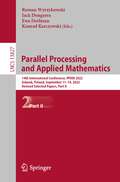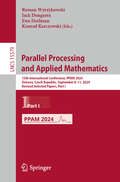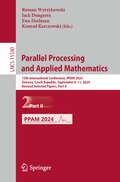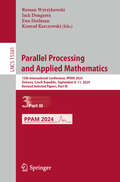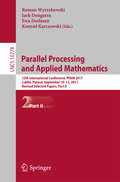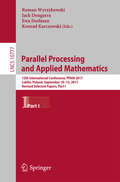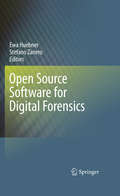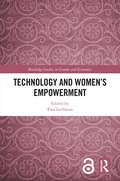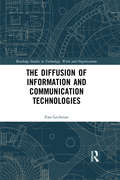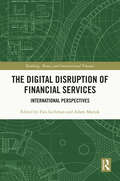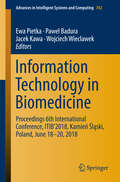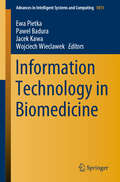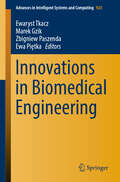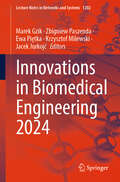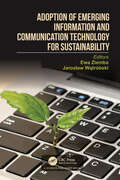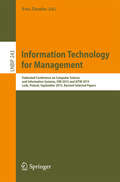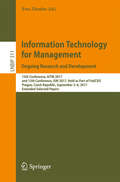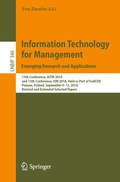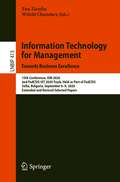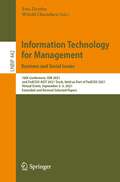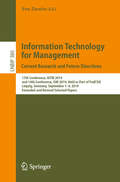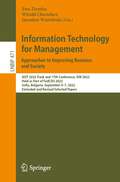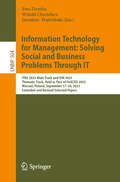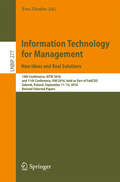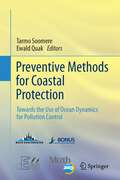- Table View
- List View
Parallel Processing and Applied Mathematics: 14th International Conference, PPAM 2022, Gdansk, Poland, September 11–14, 2022, Revised Selected Papers, Part II (Lecture Notes in Computer Science #13827)
by Roman Wyrzykowski Ewa Deelman Jack Dongarra Konrad KarczewskiThis two-volume set, LNCS 13826 and LNCS 13827, constitutes the proceedings of the 14th International Conference on Parallel Processing and Applied Mathematics, PPAM 2022, held in Gdansk, Poland, in September 2022.The 77 regular papers presented in these volumes were selected from 132 submissions. For regular tracks of the conference, 33 papers were selected from 62 submissions.The papers were organized in topical sections named as follows:Part I: numerical algorithms and parallel scientific computing; parallel non-numerical algorithms; GPU computing; performance analysis and prediction in HPC systems; scheduling for parallel computing; environments and frameworks for parallel/cloud computing; applications of parallel and distributed computing; soft computing with applications and special session on parallel EVD/SVD and its application in matrix computations.Part II: 9th Workshop on Language-Based Parallel Programming (WLPP 2022); 6th Workshop on Models, Algorithms and Methodologies for Hybrid Parallelism in New HPC Systems (MAMHYP 2022); first workshop on quantum computing and communication; First Workshop on Applications of Machine Learning and Artificial Intelligence in High Performance Computing (WAML 2022); 4th workshop on applied high performance numerical algorithms for PDEs; 5th minisymposium on HPC applications in physical sciences; 8th minisymposium on high performance computing interval methods; 7th workshop on complex collective systems.
Parallel Processing and Applied Mathematics: 15th International Conference, PPAM 2024, Ostrava, Czech Republic, September 8–11, 2024, Revised Selected Papers, Part I (Lecture Notes in Computer Science #15579)
by Roman Wyrzykowski Ewa Deelman Jack Dongarra Konrad KarczewskiThis book constitutes the refereed proceedings of the 15th International Conference on Parallel Processing and Applied Mathematics, PPAM 2024, held in Ostrava, Czech Republic, during September 8–11, 2024. The 75 full papers included in this book were carefully reviewed and selected from 134 submissions. . The papers are organized in the following topical sections: Part I : Numerical Algorithms and Parallel Scientific Computing; Architectural Aspects of HPC; Parallel Non-numerical Algorithms; GPU Computing; Performance Analysis and Prediction in HPCSystems; Environments and Frameworks for Parallel/Cloud/Edge Computing; and Applications of Parallel and Distributed Computing. Part II : First PPAM Workshop on RISC-V (RISC-V PPAM 2024); Special Session on Scheduling for Parallel Computing; 10th Workshop on Language-Based Parallel Programming (WLPP 2024); 7th Workshop on Models Algorithms and Methodologies for Hybrid Parallelism in New HPC Systems (MAMHYP 2024); and Second Workshop on Quantum Computing and Communication. Part III : First Workshop on Advancements of Global Challenges Application; Second Workshop on Applications of Machine Learning and Artificial Intelligence in High Performance Computing; 5th Workshop on Applied High Performance Numerical Algorithms for PDEs; Special Session on Parallel EVD/SVD and its Application in Matrix Computations; 6th Minisymposium on HPC Applications in Physical Sciences; and 8th Workshop on Complex Collective Systems.
Parallel Processing and Applied Mathematics: 15th International Conference, PPAM 2024, Ostrava, Czech Republic, September 8–11, 2024, Revised Selected Papers, Part II (Lecture Notes in Computer Science #15580)
by Roman Wyrzykowski Ewa Deelman Jack Dongarra Konrad KarczewskiThis book constitutes the refereed proceedings of the 15th International Conference on Parallel Processing and Applied Mathematics, PPAM 2024, held in Ostrava, Czech Republic, during September 8–11, 2024. The 75 full papers included in this book were carefully reviewed and selected from 134 submissions. . The papers are organized in the following topical sections: Part I : Numerical Algorithms and Parallel Scientific Computing; Architectural Aspects of HPC; Parallel Non-numerical Algorithms; GPU Computing; Performance Analysis and Prediction in HPCSystems; Environments and Frameworks for Parallel/Cloud/Edge Computing; and Applications of Parallel and Distributed Computing. Part II : First PPAM Workshop on RISC-V (RISC-V PPAM 2024); Special Session on Scheduling for Parallel Computing; 10th Workshop on Language-Based Parallel Programming (WLPP 2024); 7th Workshop on Models Algorithms and Methodologies for Hybrid Parallelism in New HPC Systems (MAMHYP 2024); and Second Workshop on Quantum Computing and Communication. Part III : First Workshop on Advancements of Global Challenges Application; Second Workshop on Applications of Machine Learning and Artificial Intelligence in High Performance Computing; 5th Workshop on Applied High Performance Numerical Algorithms for PDEs; Special Session on Parallel EVD/SVD and its Application in Matrix Computations; 6th Minisymposium on HPC Applications in PhysicalSciences; and 8th Workshop on Complex Collective Systems.
Parallel Processing and Applied Mathematics: 15th International Conference, PPAM 2024, Ostrava, Czech Republic, September 8–11, 2024, Revised Selected Papers, Part III (Lecture Notes in Computer Science #15581)
by Roman Wyrzykowski Ewa Deelman Jack Dongarra Konrad KarczewskiThis book constitutes the refereed proceedings of the 15th International Conference on Parallel Processing and Applied Mathematics, PPAM 2024, held in Ostrava, Czech Republic, during September 8–11, 2024. The 75 full papers included in this book were carefully reviewed and selected from 134 submissions. . The papers are organized in the following topical sections: Part I : Numerical Algorithms and Parallel Scientific Computing; Architectural Aspects of HPC; Parallel Non-numerical Algorithms; GPU Computing; Performance Analysis and Prediction in HPCSystems; Environments and Frameworks for Parallel/Cloud/Edge Computing; and Applications of Parallel and Distributed Computing. Part II : First PPAM Workshop on RISC-V (RISC-V PPAM 2024); Special Session on Scheduling for Parallel Computing; 10th Workshop on Language-Based Parallel Programming (WLPP 2024); 7th Workshop on Models Algorithms and Methodologies for Hybrid Parallelism in New HPC Systems (MAMHYP 2024); and Second Workshop on Quantum Computing and Communication. Part III : First Workshop on Advancements of Global Challenges Application; Second Workshop on Applications of Machine Learning and Artificial Intelligence in High Performance Computing; 5th Workshop on Applied High Performance Numerical Algorithms for PDEs; Special Session on Parallel EVD/SVD and its Application in Matrix Computations; 6th Minisymposium on HPC Applications in PhysicalSciences; and 8th Workshop on Complex Collective Systems.
Parallel Processing and Applied Mathematics: 4th International Conference, Ppam 2001, Naleczow, Poland, September 9-12, 2001, Revised Papers (Lecture Notes in Computer Science #2328)
by Roman Wyrzykowski Ewa Deelman Jack Dongarra Konrad KarczewskiThe two-volume set LNCS 10777 and 10778 constitutes revised selected papers from the 12th International Conference on Parallel Processing and Applied Mathematics, PPAM 2017, held in Lublin, Poland, in September 2017.The 49 regular papers presented in the proceedings were selected from 98 submissions. For the workshops and special sessions, that were held as integral parts of the PPAM 2017 conference, a total of 51 papers was accepted from 75 submissions. The papers were organized in topical sections named as follows:Part I: numerical algorithms and parallel scientific computing; particle methods in simulations; task-based paradigm of parallel computing; GPU computing; parallel non-numerical algorithms; performance evaluation of parallel algorithms and applications; environments and frameworks for parallel/distributed/cloud computing; applications of parallel computing; soft computing with applications; and special session on parallel matrix factorizations.Part II: workshop on models, algorithms and methodologies for hybrid parallelism in new HPC systems; workshop power and energy aspects of computations (PEAC 2017); workshop on scheduling for parallel computing (SPC 2017); workshop on language-based parallel programming models (WLPP 2017); workshop on PGAS programming; minisymposium on HPC applications in physical sciences; minisymposium on high performance computing interval methods; workshop on complex collective systems.
Parallel Processing and Applied Mathematics: 4th International Conference, Ppam 2001, Naleczow, Poland, September 9-12, 2001, Revised Papers (Lecture Notes in Computer Science #2328)
by Roman Wyrzykowski Ewa Deelman Jack Dongarra Konrad KarczewskiThe two-volume set LNCS 10777 and 10778 constitutes revised selected papers from the 12th International Conference on Parallel Processing and Applied Mathematics, PPAM 2017, held in Lublin, Poland, in September 2017.The 49 regular papers presented in this volume were selected from 98 submissions. For the workshops and special sessions, that were held as integral parts of the PPAM 2017 conference, a total of 51 papers was accepted from 75 submissions. The papers were organized in topical sections named as follows:Part I: numerical algorithms and parallel scientific computing; particle methods in simulations; task-based paradigm of parallel computing; GPU computing; parallel non-numerical algorithms; performance evaluation of parallel algorithms and applications; environments and frameworks for parallel/distributed/cloud computing; applications of parallel computing; soft computing with applications; and special session on parallel matrix factorizations. Part II: workshop on models, algorithms and methodologies for hybrid parallelism in new HPC systems; workshop power and energy aspects of computations (PEAC 2017); workshop on scheduling for parallel computing (SPC 2017); workshop on language-based parallel programming models (WLPP 2017); workshop on PGAS programming; minisymposium on HPC applications in physical sciences; minisymposium on high performance computing interval methods; workshop on complex collective systems.
Open Source Software for Digital Forensics
by Stefano Zanero Ewa HuebnerOpen Source Software for Digital Forensics is the first book dedicated to the use of FLOSS (Free Libre Open Source Software) in computer forensics. It presents the motivations for using FLOSS applications as tools for collection, preservation and analysis of digital evidence in computer and network forensics. It also covers extensively several forensic FLOSS tools, their origins and evolution. Open Source Software for Digital Forensics is based on the OSSCoNF workshop, which was held in Milan, Italy, September 2008 at the World Computing Congress, co-located with OSS 2008. This edited volume is a collection of contributions from researchers and practitioners world wide. Open Source Software for Digital Forensics is designed for advanced level students and researchers in computer science as a secondary text and reference book. Computer programmers, software developers, and digital forensics professionals will also find this book to be a valuable asset.
Technology and Women's Empowerment (Routledge Studies in Gender and Economics)
by Ewa LechmanThe near-ubiquitous spread of ICT offers unprecedented opportunities for social and economic agents, reshapes social and economic structures and drives the emergence of socioeconomic networks. This book contributes to the growing body of literature and present state of knowledge, offering the reader broad evidence on how new information and communication technologies impact women’s economic and social empowerment and hence have an impact on overall welfare creation. More specifically, it concentrates on demonstrating how ICT may become "empowering technologies" through their implementation. The book is designed to provide deep insight into the theoretical and empirical evidence on ICT as a significant driver of women`s social and economic development. Special focus is given to examining the following broad topics: channels of ICT impact on women's development; the role of ICT in enhancing women's active participation in formal labor markets; examples of how ICT encourages education, skills development, institutions development et alia, and thus contributes to women’s social and economic empowerment, as well as case-based evidence on ICT's role in fostering women’s equality. The primary audience for the book will be scholars and academic professionals from a wide variety of disciplines but mainly those who are concerned with addressing the issues of economic development and growth, social development, the role of technology progress in the context of broadly defined socioeconomic progress.
The Diffusion of Information and Communication Technologies (Routledge Studies in Technology, Work and Organizations)
by Ewa LechmanIn recent decades, the world has witnessed, unprecedented in terms of speed and geographic coverage, diffusion of new information and communication technologies (ICT). The on-going digital revolution pervasively impacts and reshapes societies and economies and therefore deserves special attention and interest. This book provides extensive evidence on information and communication technologies development patterns and dynamics of this process across developed economies over the period 1980 to the present day. It adopts newly developed methodology to identification of the ‘critical mass’ and isolation of technological takeoff intervals, which are intimately related to the process of technology diffusion. The statistically robust analysis of country-specific data demonstrates the key economic, social and institutional prerequisites of ICT diffusion across examined countries, indicating what factors significantly foster or – reversely – hinder the process.
The Digital Disruption of Financial Services: International Perspectives (Banking, Money and International Finance)
by Ewa LechmanThis book contributes to the present state of knowledge, offering the reader broad evidence on how new digital technologies impact financial systems. It focuses on both macro- and micro-perspectives of ICT influence on financial markets. The book demonstrates how ICT can impact trading systems or information systems, which are crucial for financial systems to work effectively. It also shows how individuals can benefit from the adoption of digital technologies for everyday financial (e.g., banking) systems usage. The book provides empirical evidence of how digital technologies revolutionize the banking sector and stock exchange trading system and explores the associations between technology and various aspects of firms’ functioning. Furthermore, it raises elements of financial inclusion, ICT-based microfinance service and finance-related gender issues. The principal audience of the book will be scholars and academic professionals from a wide variety of disciplines, particularly in the fields of finance and economics. It will be especially useful for those who are addressing the issues of new technologies and the financial markets, FinTech, financial innovations, stock markets, and the role of technological progress in a broadly defined socio-economic system. It will be a valuable source of knowledge for graduate and postgraduate students in economic and social development, information and technology, worldwide studies, social policy or comparative economics.
Information Technology in Biomedicine: Proceedings 6th International Conference, ITIB’2018, Kamień Śląski, Poland, June 18–20, 2018 (Advances in Intelligent Systems and Computing #762)
by Pawel Badura Jacek Kawa Wojciech Wieclawek Ewa PietkaITiB’2018 is the 6th Conference on Information Technology in Biomedicine, hosted every two years by the Department of Informatics & Medical Devices, Faculty of Biomedical Engineering, Silesian University of Technology. The Conference is organized under the auspices of the Committee on Biocybernetics and Biomedical Engineering of the Polish Academy of Sciences. The meeting has become an established event that helps to address the demand for fast and reliable technologies capable of processing data and delivering results in a user-friendly, timely and mobile manner. Many of these areas are recognized as research and development frontiers in employing new technology in the clinical setting. Technological assistance can be found in prevention, diagnosis, treatment, and rehabilitation alike. Homecare support for any type of disability may improve standard of living and make people’s lives safer and more comfortable. The book includes the following sections: Ø Image Processing Ø Multimodal Imaging and Computer-aided Surgery Ø Computer-aided Diagnosis Ø Signal Processing and Medical Devices Ø Bioinformatics Ø Modelling & Simulation Ø Analytics in Action on the SAS Platform Ø Assistive Technologies and Affective Computing (ATAC)
Information Technology in Biomedicine: Proceedings 6th International Conference, Itib'2018 Kamieski, Poland June 18-20 2018 (Advances in Intelligent Systems and Computing #1011)
by Pawel Badura Jacek Kawa Wojciech Wieclawek Ewa PietkaThis book provides a comprehensive overview of advances in the field of medical data science, presenting carefully selected articles by leading information technology experts. Information technology, as a rapidly evolving discipline in medical data science, with significant potential in future healthcare, and multimodal acquisition systems, mobile devices, sensors, and AI-powered applications has redefined the optimization of clinical processes. This book features an interdisciplinary collection of papers that have both theoretical and applied dimensions, and includes the following sections: Medical Data Science Quantitative Data Analysis in Medical Diagnosis Data Mining Tools and Methods in Medical Applications Image Analysis Analytics in Action on SAS Platform Biocybernetics in Physiotherapy Signal Processing and Analysis Medical Tools & Interfaces Biomechanics and Biomaterials. As such, it is a valuable reference tool for scientists designing and implementing information processing tools used in systems that assist clinicians in patient care. It is also useful for students interested in innovations in quantitative medical data analysis, data mining, and artificial intelligence.
Innovations in Biomedical Engineering (Advances in Intelligent Systems and Computing #925)
by Ewa Piętka Marek Gzik Ewaryst Tkacz Zbigniew PaszendaThis book presents the proceedings of the “Innovations in Biomedical Engineering IBE’2018” Conference held in Katowice, Poland from October 18 to 20, 2018, and discusses recent research on innovations in biomedical engineering. The book covers a broad range of subjects related to biomedical engineering innovations. Divided into four parts, it presents state-of-the-art advances in: Engineering of biomaterials, Modelling and simulations in biomechanics, Informatics in medicine, and Signal analysis. By doing so, it helps bridge the gap between technological and methodological engineering achievements on the one hand and clinical requirements in the three major areas diagnosis, therapy and rehabilitation on the other.
Innovations in Biomedical Engineering 2024 (Lecture Notes in Networks and Systems #1202)
by Ewa Piętka Marek Gzik Zbigniew Paszenda Krzysztof Milewski Jacek JurkojćThe presented monograph is a compact study covering articles dealing with activities closely related to Biomedical Engineering. Papers on biomaterials, biomechanics, as well as the use of information technology and engineering modelling methods in medicine are presented, divided into two chapters. The topics include not only theoretical considerations, but also practical applications of research conducted in cooperation between engineers, doctors and physiotherapists.We believe that the presented works will have an impact on the development of the Biomedical Engineering field of science. We would like to thank all the people who contributed to the creation of this monograph - both the authors of all the works and those involved in technical works.
Adoption of Emerging Information and Communication Technology for Sustainability
by Ewa Ziemba JarosławThis book represents an important voice in the discourse on the adoption of emerging ICT for sustainability. It focuses on how emerging ICT acts as a crucial enabler of sustainability, offering new forward-looking approaches to this field. The book explores how emerging ICT adoption drives sustainability efforts in business and public organizations, promoting ecological, economic, social, cultural, and political sustainability. The book's theoretical discussions, conceptual approaches, empirical studies, diverse perspectives, and views make it a valuable and comprehensive reference work. Appealing to both researchers and practitioners, this book provides significant areas for research and practice related to the contribution of emerging ICT adoption to sustainability. It also suggests vital considerations for programming and building sustainable development-driven emerging ICT adoption. Readers will find answers to important contemporary questions, such as: What are the concepts, frameworks, models, and approaches to enhance sustainable development through the adoption of emerging ICT? How does the adoption of emerging ICT influence sustainability? How can emerging ICT be adopted to enhance sustainability? What are the current practices and successful cases of emerging ICT adoption for sustainability? What factors influence emerging ICT adoption to enhance sustainability?
Information Technology for Management
by Ewa ZiembaThis book constitutes revised and extended versions of the best papers from the 10th Conference on Information Systems Management (ISM 2015) and 13th Conference on Advanced Information Technologies for Management (AITM 2015), held in Lodz, Poland, September 2015 as part of the Federated Conference on Computer Science and Information Systems (FedCSIS 2015). These events constitute a forum for the exchange of ideas for practitioners and theorists working in the broad area of information systems management in organizations and to present and discuss the current issues of IT in business applications. The 11 full papers included in this volume were carefully reviewed and selected originally 54 submissions. They focus on knowledge management systems; information technology for business and public organizations; and evaluation of information systems.
Information Technology for Management. Ongoing Research and Development: 15th Conference, Aitm 2017, And 12th Conference, Ism 2017, Held As Part Of Fedcsis, Prague, Czech Republic, September 3-6, 2017, Extended Selected Papers (Lecture Notes In Business Information Processing #311)
by Ewa ZiembaThis book constitutes extended selected papers from the 15th Conference on Advanced Information Technologies for Management, AITM 2017, and the 12th Conference on Information Systems Management, ISM 2017, held as part of the Federated Conference on Computer Science and Information Systems, FedCSIS, which took place in Prague, Poland, in September 2017. The 13 papers presented in this volume were carefully reviewed and selected from 48 submissions. They were organized in topical sections named: information technology and systems for knowledge management; information technology and systems for business transformation; and implementation and evaluation of information systems.
Information Technology for Management: 15th Conference, AITM 2018, and 13th Conference, ISM 2018, Held as Part of FedCSIS, Poznan, Poland, September 9–12, 2018, Revised and Extended Selected Papers (Lecture Notes in Business Information Processing #346)
by Ewa ZiembaThis book constitutes extended selected papers from the 16th Conference on Advanced Information Technologies for Management, AITM 2018, and the 13th Conference on Information Systems Management, ISM 2018, held as part of the Federated Conference on Computer Science and Information Systems, FedCSIS, which took place in Poznan, Poland, in September 2018. The total of 9 full and 3 short papers presented in this volume were carefully reviewed and selected from a total of 43 submissions. The papers selected to be included in this book contribute to the understanding of relevant trends of current research on information technology for management in business and public organizations. They were organized in topical sections named: information technology and systems for knowledge management, and information technology and systems for business transformation.
Information Technology for Management: 15th Conference, ISM 2020, and FedCSIS-IST 2020 Track, Held as Part of FedCSIS, Sofia, Bulgaria, September 6–9, 2020, Extended and Revised Selected Papers (Lecture Notes in Business Information Processing #413)
by Ewa Ziemba Witold ChmielarzThis book constitutes revised selected and extended papers presented at track 4 of the Conference on Computer Science and Intelligence Systems, FedCSIS 2020, which took place in Sofia, Bulgaria, during September 6–9, 2020. The FedCSIS Information Systems and Technologies Track included AIST 2020, DSH 2020, ISM 2020, and KAM 2020. For this track, a total of 29 submissions was received from which a total of 5 full and 3 short papers was accepted for publication in this volume. The papers were organized in topical sections named: improving project management methods; numerical methods of solving management problems; and technological infrastructure for business excellence.
Information Technology for Management: 16th Conference, ISM 2021, and FedCSIS-AIST 2021 Track, Held as Part of FedCSIS 2021, Virtual Event, September 2–5, 2021, Extended and Revised Selected Papers (Lecture Notes in Business Information Processing #442)
by Ewa Ziemba Witold ChmielarzThis book constitutes revised selected and extended papers presented at track 4 on "Advances in Information Systems and Technologies" of the Conference on Computer Science and Intelligence Systems, FedCSIS 2021, which was held online during September 2–5, 2021. The FedCSIS Track 4 included AIST 2021, DSH 2021, ISM 2021, and KAM 2021. For this track, a total of 30 submissions was received from which a 7 full papers and 1 short papers were accepted for publication in this volume. The papers were organized in topical sections named as follows: Approaches to improving management systems; solutions to social issues; methods for supporting business and society.
Information Technology for Management: 17th Conference, AITM 2019, and 14th Conference, ISM 2019, Held as Part of FedCSIS, Leipzig, Germany, September 1–4, 2019, Extended and Revised Selected Papers (Lecture Notes in Business Information Processing #380)
by Ewa ZiembaThis book constitutes extended selected papers from the 17th Conference on Advanced Information Technologies for Management, AITM 2019, and the 14th Conference on Information Systems Management, ISM 2019, held as part of the Federated Conference on Computer Science and Information Systems, FedCSIS, which took place in Leipzig, Germany, in September 2019. The total of 7 full and 6 short papers presented in this volume were carefully reviewed and selected from a total of 45 submissions. The papers selected to be included in this book contribute to the understanding of relevant trends of current research on and future directions of information technology for management in business and public organizations. They were organized in topical sections named: information technology assessment for future development; methods and models for designing information technology, and aspects of implementing information technology.
Information Technology for Management: AIST 2022 Track and 17th Conference, ISM 2022, Held as Part of FedCSIS 2022, Sofia, Bulgaria, September 4–7, 2022, Extended and Revised Selected Papers (Lecture Notes in Business Information Processing #471)
by Ewa Ziemba Witold Chmielarz Jarosław WątróbskiThis book constitutes revised selected and extended papers presented at track 4 of the Conference on Computer Science and Intelligence Systems, FedCSIS 2022, which took place in Sofia, Bulgaria, during September 4–7, 2022.The FedCSIS Information Systems and Technologies Track included AIST 2022, ISM 2022, DSH 2022, and KAM 2022. AIST 2022 received 11 submissions, from which 2 full papers and 1 short paper have been accepted; for ISM 2022 2 full and 3 short papers have been accepted from 15 submissions; and for DSH 2022 2 full and 1 short papers have been accepted from 11 submissions. From the 17 submissions to KAM 2022, no paper passed the extended reviews, so the overall acceptance rate was 20% for full and 18% for short papers. The papers were organized in topical sections named: Approaches to improving business; approaches to improving society; and methods for improving business and society.
Information Technology for Management: ITBS 2023 Main Track and ISM 2023 Thematic Track, Held as Part of FedCSIS 2023, Warsaw, Poland, September 17–20, 2023, Extended and Revised Selected Papers (Lecture Notes in Business Information Processing #504)
by Ewa Ziemba Witold Chmielarz Jarosław WątróbskiThe present book includes extended and revised versions of a set of selected papers submitted to the Topical Area of Information Technology for Business and Society, ITBS 2023, and two Thematic Tracks: Information System Management, ISM 2023, and Knowledge Acquisition and Management, KAM 2023, held in Poland, Warsaw, during September 17- 20, 2023. ITBS 2023 received 26 submissions, from which 6 full papers and 2 short papers have been accepted; for ISM 2023 3 full papers and 1 short paper have been accepted from 21 submissions; and for KAM 2023 1 full paper has been accepted from 7 submissions. From the 6 submissions to DSH 2023, no paper passed the extended reviews. The accepted papers are grouped in sections on IT in Improving of Management Systems, Approaches to Improving of Social Problems, and Methods of Solving Business.
Information Technology for Management: New Ideas and Real Solutions
by Ewa ZiembaThis book constitutes revised selected papers from the 14th Conference on Advanced Information Technologies for Management, AITM 2016, and the 11th Conference on Information Systems Management, ISM 2016, held as part of the Federated Conference on Computer Science and Information Systems, FedCSIS, which took place in Gdansk, Poland, in September 2016. The 13 papers presented in this volume were carefully reviewed and selected from 51 submissions. They were organized in topical sections named: information technology and systems for knowledge management; information technology and systems for business transformation; and implementation and evaluation of information systems.
Preventive Methods for Coastal Protection: Towards the Use of Ocean Dynamics for Pollution Control
by Ewald Quak Tarmo SoomereThe aim of the book is to present for non-specialist researchers as well as for experts a comprehensive overview of the background, key ideas, basic methods, implementation details and a selection of solutions offered by a novel technology for the optimisation of the location of dangerous offshore activities in terms of environmental criteria, as developed in the course of the BalticWay project. The book consists of two parts. The first part introduces the basic principles of ocean modeling and depicts the long way from the generic principles to the practical modeling of oil spills and of the propagation of other adverse impacts. The second part focuses on the techniques for solving the inverse problem of the quantification of offshore areas with respect to their potential to serve as a source of environmental danger to vulnerable regions (such as spawning, nursing or also tourist areas). The chapters are written in a tutorial style; they are mostly self-contained and understandable for non-specialist researchers and students. They are carefully peer-reviewed by international experts. The goal was to produce a book that highlights all key steps, methods, models and data sets it is necessary to combine in order to produce a practically usable technology and/or decision support system for a particular sea region. Thus the book is useful not only as a description and a manual of this particular technology but also as a roadmap highlighting the complicated technical issues of ocean modeling for practical purposes. It describes the approaches taken by the authors in an understandable way and thus is useful for educational purposes, such as a course in industrially and environmentally relevant applications of ocean modeling.
